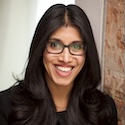“Rethinking Batson and Credibility in the Courtroom,” 4/11 KICD Colloquium with Wesleyan Prof. of Government Sonali Chakravarti
04/11/2025
In her April 11 talk, fully titled, “Whose Commitment to Impartiality Can Be Believed? Rethinking Batson and Credibility in the Courtroom,” Wesleyan University Professor of Government Sonali Chakravarti will present recent state-level jury selection reform efforts as necessary to the larger project of changing the epistemic landscape of the courtroom in ways that better treat the knowledge of Black jurors as essential to the work of justice. The talk will be held at 3:30pm in Jesse 410, and anyone interested in attending virtually can do so here, via YouTube.
Abstract
Studies have shown that Black jurors are called for jury service at a lower rate than White jurors and dismissed at a higher one. In 1986, the Supreme Court ruled that racial discrimination against even one juror was grounds for calling a new jury, but its remedy, “The Batson Hearing,” was not efficacious. Now, states such as Washington and Connecticut are reforming the jury selection process to address racial discrimination through making certain reasons presumptively invalid as reasons to dismiss a juror, including having had negative experiences with or expressing a distrust of law enforcement, orientations that would previously have been seen in tension with the responsibilities of being a juror. Through an analysis of Batson v. Kentucky (1986) and State v. Holmes (2019) in Connecticut, the talk will argue that the reforms are a critical step to changing the epistemic landscape of the courtroom, that is, how judges, lawyers, and jurors are seen as credible and able to make impartial decisions. The reforms are an important step to treating Black jurors as enfranchised citizens whose knowledge is necessary for the work of justice.
 Sonali Chakravarti is Professor of Government at Wesleyan University and currently a fellow at the Edward and Lily Safra Center for Ethics at Harvard University. Her work focuses on questions of emotions, the law, and democratic institutions. She is the author of two books—Radical Enfranchisement in the Jury Room and Public Life (Chicago University Press, 2019) and Sing the Rage: Listening to Anger After Mass Violence (University of Chicago Press, 2014)—as well as articles in publications including Political Theory, Theory and Event, and the Journal of Law, Culture, and the Humanities. Her public writing on juries has appeared in the Boston Review, the Atlantic, and the Guardian. She is currently working on a manuscript about the meaning of impartiality for jurors who are critical of the police and the legal system. She earned a BA from Swarthmore College and a PhD in Political Science from Yale University.
Sonali Chakravarti is Professor of Government at Wesleyan University and currently a fellow at the Edward and Lily Safra Center for Ethics at Harvard University. Her work focuses on questions of emotions, the law, and democratic institutions. She is the author of two books—Radical Enfranchisement in the Jury Room and Public Life (Chicago University Press, 2019) and Sing the Rage: Listening to Anger After Mass Violence (University of Chicago Press, 2014)—as well as articles in publications including Political Theory, Theory and Event, and the Journal of Law, Culture, and the Humanities. Her public writing on juries has appeared in the Boston Review, the Atlantic, and the Guardian. She is currently working on a manuscript about the meaning of impartiality for jurors who are critical of the police and the legal system. She earned a BA from Swarthmore College and a PhD in Political Science from Yale University.
FEATURED EVENTS
04/22/2025
05/13/2025
04/11/2025
04/25/2025
